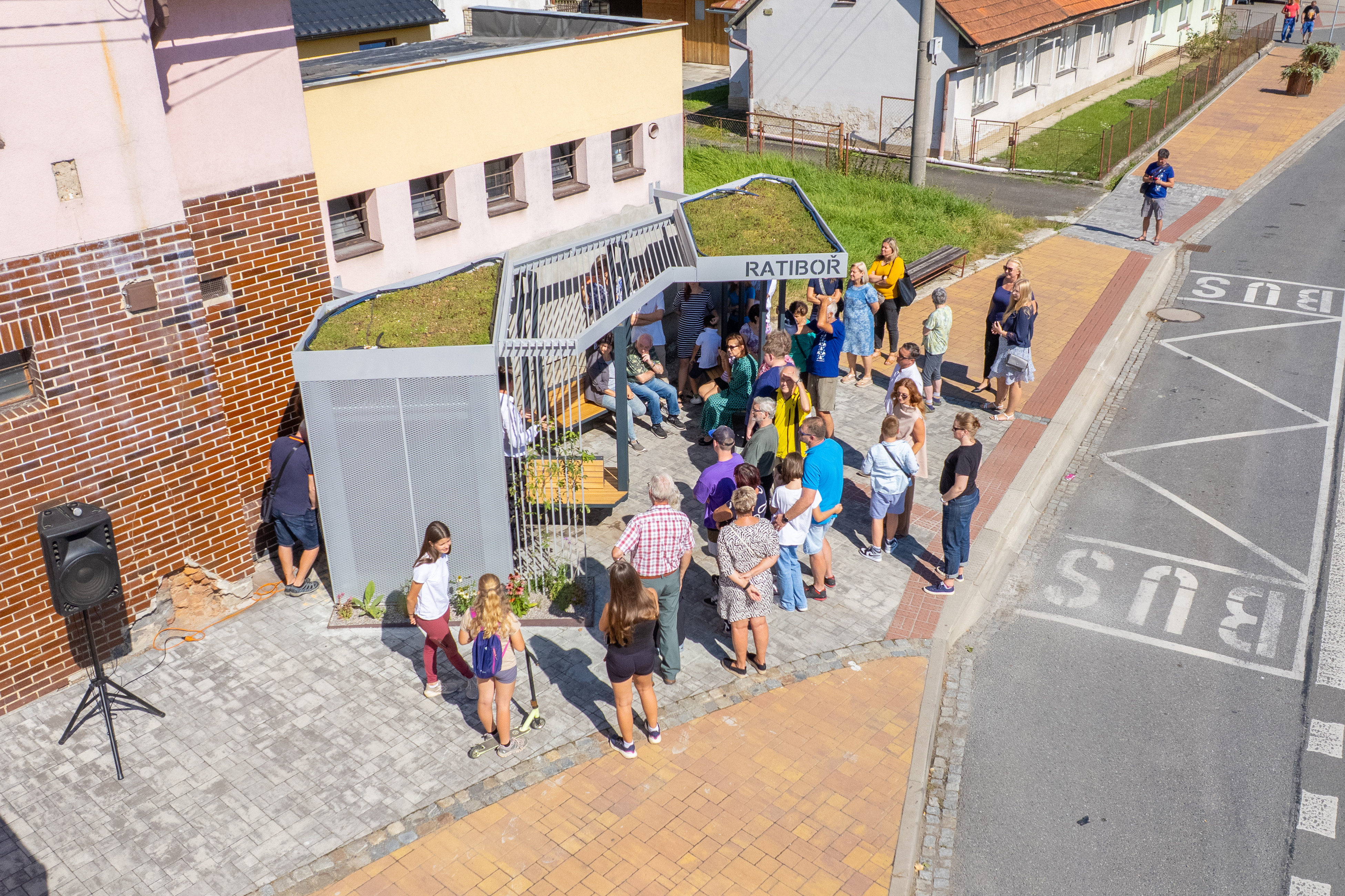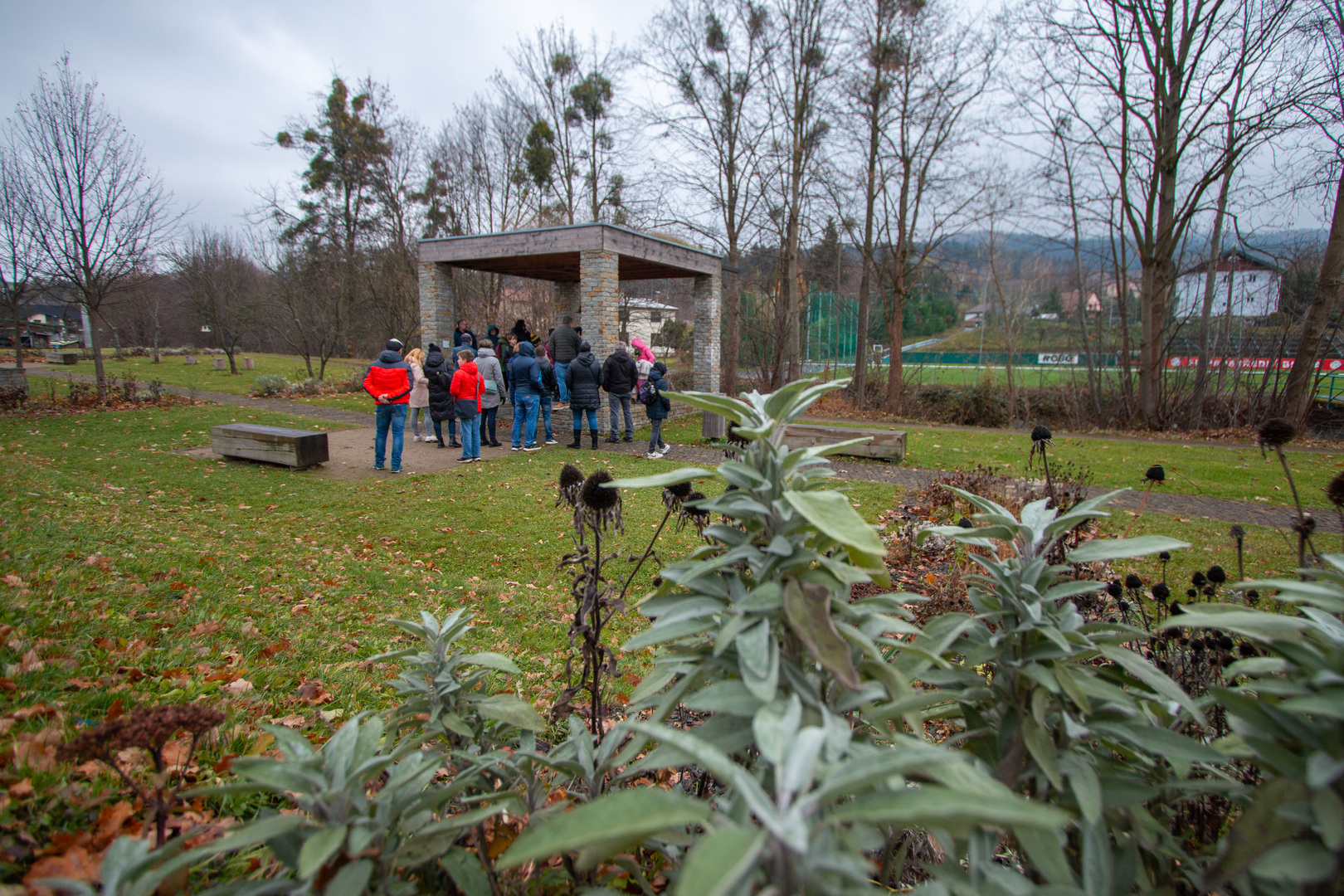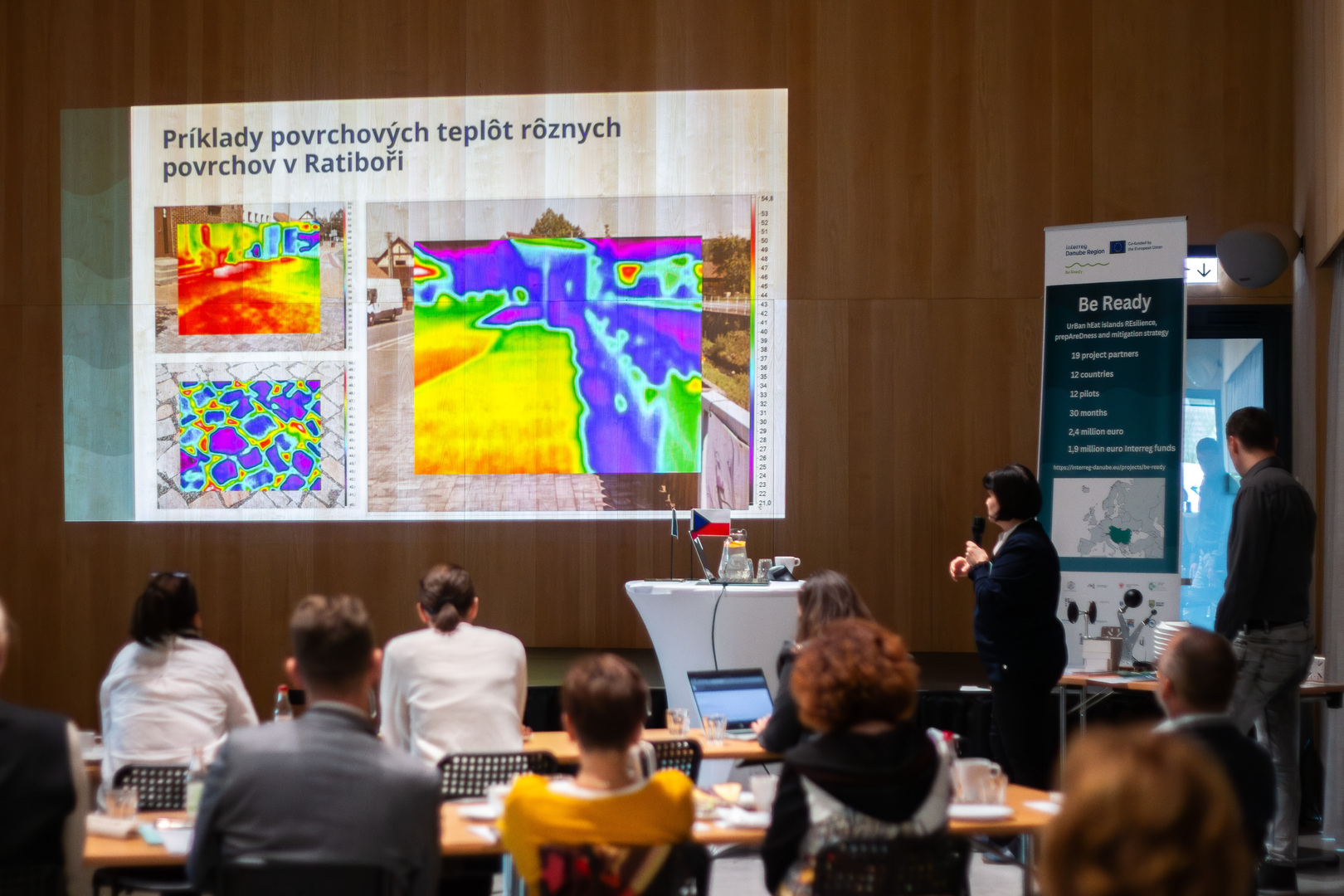Article title
Through a short VIDEO let's get acquainted with an international project, supported by EU funds, in which the municipality of Ratiboř will be looking for a suitable solution for an area of over 6,000m² right in the centre of our municipality...
The unfavourable climatic conditions are most pronounced in this place, especially in the hot season, which is aggravated by the high intensity of car traffic.
September 1, 2025
Installation of a bioclimatic bus stop and its ceremonial presentation
Based on measurements and evaluation of the Perception Map, the area with the greatest degree of thermal discomfort for the inhabitants of the village was located. This is the glass-enclosed bus stop near the cinema. The area is open to the south and is very hot on sunny summer days.
We dismantled the original glass bus stop, a solution was designed, and in cooperation with the company www.fairteco.eu, a unique prototype of a bioclimatic bus stop was produced, operating on the principle of an adiabatic cooling system. Water flowing through honeycomb panels cools the air flowing through these panels. The water circulates in the panels and is also used for automatic irrigation of greenery at 16-hour intervals.
The testing phase will now begin.
 More information and photos can be found in this post on the municipal website:
More information and photos can be found in this post on the municipal website:
www.ratibor.cz/obec/p1976-slavnostni-predstaveni-bioklimaticke-zastavky-v-ratibori
June 24, 2025
Evaluation of the Perception Map
In the first half of June, a survey was conducted among the residents of Ratiboř to assess their perception of thermal comfort in public spaces. One hundred respondents from across all age groups and professional categories took part, with women accounting for 54% of the total.
What did the survey reveal?
- The most popular places for refreshment and leisure are locations with plenty of greenery and natural shade.
- Conversely, places where people do not feel comfortable in summer were identified, typically due to overheating and a lack of shaded areas.
- Respondents also suggested locations where the municipality could improve conditions for spending time outdoors on hot days.
 More information and visualisation on the map in this post on the municipal website:
More information and visualisation on the map in this post on the municipal website:
www.ratibor.cz/obec/p1937-pocitove-mapy-vyhodnoceni
June 24, 2025
Ratiboř joins the international Be Ready Project!
The municipality of Ratiboř has become an active partner in the BE READY project, which focuses on solving the problem of urban overheating (so-called urban heat islands) in the Danube region. As part of the project, a Mapping Report was prepared, which provides specific recommendations and best practices for effective cooling of public spaces using green, blue and reflective measures.
Ratiboř contributed its own data and experience – for example, it was found that the temperature difference between vegetated and asphalt surfaces can reach up to 7 °C on hot days. Together with other partners, we will design and implement pilot solutions to help improve the microclimate and living conditions in the municipality.
You can read the full report here or in the files available for download below.
2.6. 2025
For a better overview of the key points of the BE READY project, we recommend taking a look at the attached infographic.


May 30, 2025
In cooperation with the agency JINAG, we have published a Feeling Map of the municipality of Ratiboř as part of the BE READY project.
Help us capture the places you enjoy and those that call for change. Tell us where there is life and where there could be more! Your feedback is crucial – it will help us move Ratiboř forward in the right direction...
 For more information about the Feeling Map and an info video on how to fill it in, see this article on the municipal website:
For more information about the Feeling Map and an info video on how to fill it in, see this article on the municipal website:
www.ratibor.cz/obec/p1916-zapojte-se-take-do-projektu-be-ready
www.ratibor.cz/obec/p1913-pocitova-mapa-prosime-o-vyplneni
6. 5. 2025
On May 6, 2025, another Local Climate Sandbox focused on the issue of urban heat islands (UHI) took place at the Multifunctional Community Center in Ratiboř. This part of the BE READY project was dedicated to informing the public about the results of the UHI vulnerability and risk assessment in Ratiboř. Representatives of JINAG introduced us to the possibility of collecting data using perception maps, which will take place in Ratiboř in the first half of June. Last but not least, architect Libor Sošťák presented pilot measures to address UHI in the village of Ratiboř.
 More information about the webinar can be found in this article on the municipal website:
More information about the webinar can be found in this article on the municipal website:
www.ratibor.cz/en/obec/p1896-projekt-be-ready-druhy-wokshop-zamereny-na-teplene-ostrovy-v-ratibori
1.–2. 4. 2025
As part of the BE READY project, last week we attended a meeting in Brno, organized by the South Moravian Agency for public innovation. Here, the measures that will be piloted during the summer months in places that have been identified according to the methodology as the largest UHI "Urban Heat Islands" - in the front of Ratibor, this is the village square in the centre of the village.
 This is because urban heat islands pose a serious risk to the health of residents, especially during hot summer days and nights when concrete surfaces maintain high temperatures. This can lead to heat stress, fatigue, dizziness and, in extreme cases, heat stroke.
This is because urban heat islands pose a serious risk to the health of residents, especially during hot summer days and nights when concrete surfaces maintain high temperatures. This can lead to heat stress, fatigue, dizziness and, in extreme cases, heat stroke.
28. 3. 2025
The second year of the implementation of the international project BE READY supported by the EU Interreg Danube programme is to apply the proposed solutions that will contribute to more favourable climatic conditions, especially in the hot season, in the area directly in the centre of the municipality of Ratiboř. Such a place is called Urban Heat Island (UHI) and in the municipality of Ratiboř this area covers more than 6000 m². The aim of the project was to design suitable solutions using blue and green elements, then test/pilot the functionality of the solutions used.
 In the video below you can see the mentioned UHI area in Ratiboř.
In the video below you can see the mentioned UHI area in Ratiboř.
Another public workshop will be organised in the spring to give you the opportunity to see the specific measures proposed. These blue and green elements will then be installed between July and September 2025. Your feedback on how you feel about our UHI site will be very important throughout the process. You will therefore be able to record your feelings before and during the implementation of this project via the official notice board and online.
It is important to strengthen awareness and our efforts for climate adaptation and prevention of UHI (Urban Heat Island) mitigation in our municipality as well, because it is very clear that climate change brings new challenges and new solutions for our daily life.
17. 3. 2025
WEBINAR Urban heat islands (UHI) - how to deal with them?
With rising temperatures and the climate crisis, urban heat islands are becoming an increasingly pressing problem even in smaller communities. How to deal with this phenomenon and how to protect our cities, towns and their inhabitants? This is what participants could learn in the webinar of the BE READY project, which aims to provide comprehensive information and practical solutions for municipalities, cities, urban planners and citizens themselves, based on scientific knowledge and heat island risk assessments from pilot areas...
Recording of the LIVE broadcast on FB:
www.facebook.com/events/1529509461063657
For more information about the webinar, see this article on the municipal website:
www.ratibor.cz/obec/p1842-webinar-mestske-tepelne-ostrovy-uhi-jak-se-s-nimi-vyporadat
19. 11. 2024
Trip to Prostřední Bečva to see examples of good practice.
On 19/11/2024, as part of a trip to see examples of good practice, participants were introduced to the BE READY project. The concept of Urban Heat Islands (UHI), the objectives of the project as well as the aim of the good practice trip were explained. In 2015-2017, the municipality of Prostřední Bečva, which has a very similar population, size and landscape character as Ratiboř, implemented several projects.
 More information about the good practice trip to Horní Bečva can be found in this article on the municipal website:
More information about the good practice trip to Horní Bečva can be found in this article on the municipal website:
www.ratibor.cz/obec/p1759-projekt-be-ready-voda-a-zelen-na-prostredni-becve
Discussion with meteorologist Michal Žák
In the afternoon, during a 50-minute lecture by a leading Czech meteorologist, moderator and educator, the participants were introduced to the real threat of climate change impacts that we are currently experiencing. Mr. Žák presented to the participants scientific perspectives and real impacts of climate change and possible adaptation and mitigation goals that every individual, community, state and the whole planet should have. Attendees were presented with trend graphs specifically for the municipality of Ratiboř, which showed, for example, the development of the number of tropical days or nights or the development of the number of days with snow cover of at least 10 cm. The subsequent half-hour discussion was marked by more and less expert questions on the topic "Climate change and us".
More information about the discussion with Michal Žák can be found in this article on the municipal website:
www.ratibor.cz/obec/p1737-zmena-klimatu-a-my-beseda-s-meteorologem-michalem-zakem
31. 10. 2024
On 31 October 2024, a workshop focused on the issue of urban heat islands took place at the Multifunctional Community Centre in the village of Ratiboř. The event met with great interest from the professional public, representatives of municipalities, the Zlín Region and experts from various sectors. The municipality of Ratiboř is a pilot partner in this project.
 The report, which was broadcast by Czech Television in Regional Events on 31 October 2024, can be found on the CT website at 7:40-9:40 here: www.ceskatelevize.cz/porady/10122427178-udalosti-v-regionech-brno/324281381991031
The report, which was broadcast by Czech Television in Regional Events on 31 October 2024, can be found on the CT website at 7:40-9:40 here: www.ceskatelevize.cz/porady/10122427178-udalosti-v-regionech-brno/324281381991031
More information about the workshop can be found in this article on the municipal website:
www.atibor.cz/obec/p1732-lokalni-workshop-projektu-be-ready
12. 8. 2024
As part of the BE READY project, the measurement of heat islands ( UHI) is taking place in Ratiboř. Two weather stations have been newly installed in the municipality to continuously record air temperature, rainfall and humidity. These weather stations also measure wind direction and speed. The information, which is continuously transmitted to the web application, will be further used and evaluated in the framework of this project.

For more information about the measurements, see this article on the municipal website:
www.ratibor.cz/obec/p1678-mereni-teplenych-ostrovu-uhi-v-ramci-projektu-be-ready
6. 8. 2024
BE READY = Resilience, Preparedness and Mitigation Strategy for Urban Heat Islands
A total of 12 cities from all states in the Danube region will be involved in the pilot testing. In the Czech Republic, this will be the municipality of Ratiboř. The main outputs of the project include jointly developed and implemented methodologies and toolkits for urban heat island risk assessment, data analysis and modelling at city level.
Watch the VIDEO next to this post.
In the framework of the project we are working not only with Czech partners
JINAG
plays a key role in supporting the definition of pilot projects and the development of toolkits for cities and municipalities. The agency is actively involved in formulating policy recommendations and disseminating them to its regional partners, thereby supporting projects focused on environmental protection and climate change adaptation. Through cooperation with national and EU authorities, JINAG ensures comprehensive support and coherence with broader policy frameworks.
www.jinag.eu
DEX Innovation Centre
As the EIT Health HUB for the Czech Republic, the Be Ready project focuses on the impacts of environmental change on human health. This includes mapping best practices in the regions and, last but not least, providing support to the Czech project partner Municipality of Ratiboř in the implementation of the project, which is one of the key roles of the DEX IC within this project.
www.dex-ic.com
Slovak University of Technology in Bratislava
is the scientific partner of the project Be Ready. STUBA is involved in the preparation of a methodology for the identification of heat islands in municipalities and is working with the municipality of Ratiboř to produce a document on heat islands. It is also implementing local measurement and recording of climate data that will help the municipality to process, interpret and use in the heat island document. As a scientific partner of the project, it is helping to organise and implement a local thematic workshop.
www.stuba.sk
This project is supported by the Interreg Danube Region programme co-funded by the European Union.

22. 4. 2024
On the occasion of International Earth Day, we present an EU-funded project to support partner cities to increase resilience to the negative impacts of heat islands...
12 cities in total from all countries in the Danube region.

Within this framework, effective measures will be developed, tested and implemented to help tackle heat islands. Within our municipality, specific solutions for an area of over 6,000 m² will be tested in a pilot project right in the centre of our municipality.
 These solutions will focus on green measures based on vegetation and blue measures focusing on new uses of water resources. The main outputs of the project include jointly developed and implemented methodologies and toolkits for urban heat island risk assessment, data analysis and modelling at city level.
These solutions will focus on green measures based on vegetation and blue measures focusing on new uses of water resources. The main outputs of the project include jointly developed and implemented methodologies and toolkits for urban heat island risk assessment, data analysis and modelling at city level.
What does this mean for people?
Urban heat islands have a negative impact on the people who live in them. Higher temperatures affect not only the physical and mental well-being of city residents, but also the quality of the environment, not to mention the higher costs of air conditioning buildings. The expected benefit of the proposed solutions is to reduce the temperature in towns and cities by up to 1 degree Celsius and thus mitigate the negative impacts mentioned above.
Project No.: DRP0200793
Project start date: 1 January 2024
Interreg DANUBE (2021–2027)
Project coordinator: Sofia Development Association
Implementation period: 01/2024–06/2026
THE AIM OF THE PROJECT IS:
- Provide cities with assessment and operational tools to better understand the causes and effects of UHI.
- Share methodologies for vulnerability and environmental assessment.
- Co-develop, test and validate jointly developed solutions to mitigate the effects of UHI through 12 pilot projects in cities.
- Based on traditional Chinese practice that uses small but effective strategies to address the problem, use three types of solutions (green=green, white=surface and blue=water).
- Improve city resilience, preparedness and adaptation to UHI through action plans and strategies.
You can get involved and support actions to fight climate change also in the municipality of Ratibor and make the world more sustainable for all. More information about the project can be found on our social media pages on Facebook and LinkedIn and also on the project website: www.interreg-danube.eu/projects/be-ready.





